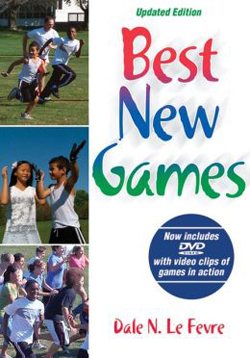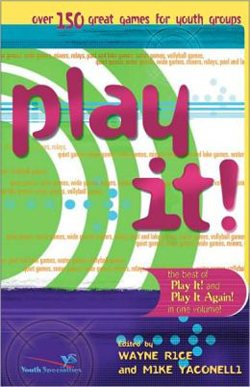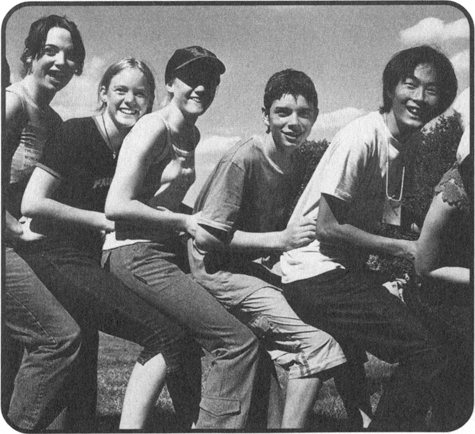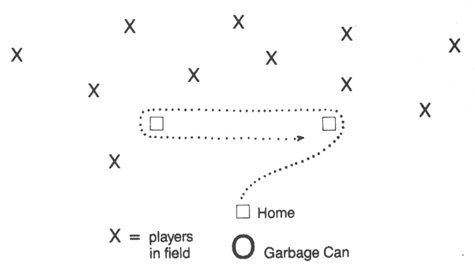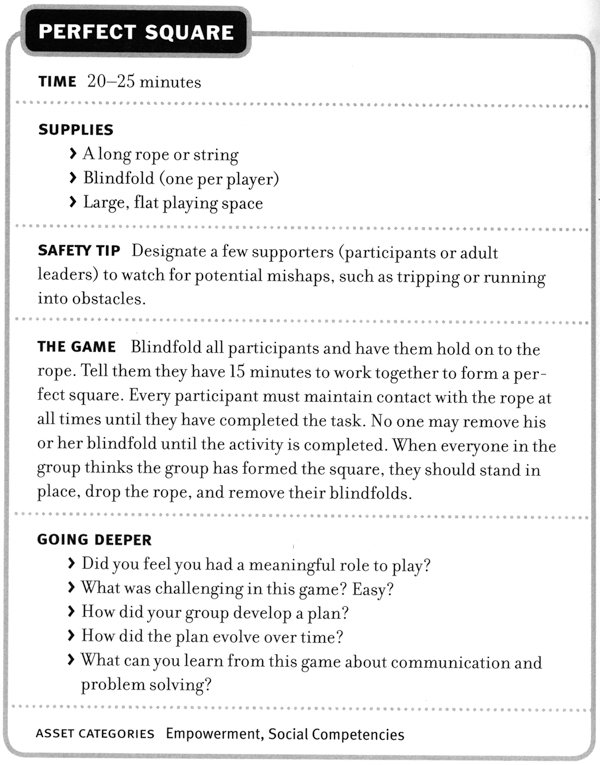Get off your screen and come have fun! Run around, chase a ball, make a face, best your friend, be silly, make up a game. When you run out of ideas, here are some more.
New games were invented by Stewart Brand in the 1970s to introduce cooperation and open-ended play into overly competitive games. These type of games like to unfold outdoors, involve large groups of people (5 -50), include all abilities. In contrast to sports games none of them require equipment, and everyone wins. The main point of these games is simply to keep fun going as long as possible. Dale LeFevre has been running new games for 30 years and has collected the best of them here in Best New Games. Playing some of these 77 games has been the most fun I’ve had in years. Good for family reunions, scouts, school picnics, summer campgrounds.
Play It! is a densely packed book of game ideas for youth groups — church, camp or school. Many of these might better be described as activities, such as scavenger hunts, or role playing situations. They depend on easily gathered props, but also require some preplanning and set up. They are not as spontaneous, but kids love them.
Small groups benefit from playing games together, so a cottage industry has emerged to lead games for organizational and business teams. A deliberate sequence of games starting with fun icebreakers, then onto ones building trust, and ending with celebration games can strengthen teamwork. The best selection I’ve seen for “serious play” games are in Great Group Games. Suggested game options are grouped by their function in the “learning” sequence. In a business setting these team-building games require the right tactful facilitator (not the boss!) to lead, but many of them also work fine informally with a family or friends.
Come on, put that screen down!
-- KK
Best New Games
Dale LeFevre
2012, 256 pages
$29
Available from Amazon
Play It!
Wayne Rice, Mike Yaconelli
2000, 120 pages
$7, Kindle; paperback used from $4
Available from Amazon
Great Group Games
Susan Ragsdale, Ann Saylor
2007, 228 pages
$11
Available from Amazon
Sample Excerpts:
From Best New Games
So what is a New Game? It is a cooperative group interactive game that is done just for fun and is for everybody regardless of age, size, gender, or ability level. The games sometimes include competition, but anybody can win. That’s because when there is winning, it is only one element rather than the main element of a game. No trophies or awards are given for winning; we simply go on to another game. This way, everyone can play without having to suffer the extremes of competition. Instead of being eliminated, players change roles or sides and keep playing. And always, enjoying a New Game is more important than winning it. In this sense, everybody wins every game.
*
Zip, Zap, Pop
Description of Game
Who needs snap, crackle, and pop when you have “zip, zap, pop”? The group sits together in a close circle. The first thing to pass around is a “zip,” which is accomplished by placing a hand on top of the head with the fingers pointing at the person on one side while saying “Zip.” The person on that side also puts a hand on top of his or her head with fingers pointing in the same direction while saying “Zip.” It passes from person to person this way around the circle. Practice this in one direction and then the other.
The next thing to learn is a “zap,” which is done by putting the hand under the chin the opposite direction from which a zip is coming. A zap makes a zip reverse directions. And, of course, if one zaps a zap, the zip rereverses directions. A “pop” is done by pointing to anyone in the circle, who then has to either start passing a zip, zap it back, or pop to someone else.
*
Lap Game
We first get the group into a very tight standing circle facing in so that each person is touching the person next to him or her. Everyone takes a quarter turn in the same direction so that each person is facing the back of a person. (This is often the hardest part. Invariably, several players turn the opposite way.)
Each player puts the hands on the hips of the player in front of him or her. It is important to get the proper spacing. If everyone’s arms are stretched out, people are too far away from one another and they need to take a step in toward the center. If people are too close, they need to take a step out from the center. Try small step adjustments first. The idea is to be able to sit on the knees of the person in back of you while having the person in front of you sit on your knees. Having someone sit on your thighs is painful!
At the count of three, you might try having everyone touch down briefly to see if they are all connecting properly. Then have the group all sit on each others knees all at the same time, perhaps with the magic words “On my knees, please.”
***
From Play It!
Time Warp Tag
Here’s another crazy version of the most famous of all games. You simply play a regular game of tag but at the blow of a whistle, each player (including “It”) must slow down to a speed equal to a sports replay “slo-mo.” In other words, they must do everything in slow motion. Kids will soon get the hang of it and become very exaggerated in their motions.
Make sure the kids do everything in Time Warp state, even talking and shouting. The game can be played in total Time Warp, or you can blow the whistle for start/stop intervals. Limit the size of the playing area so that several players have a chance to become “It.”
*
Swedish Baseball
This variation of baseball is most effective with 25 or more participants. Teams are divided equally with one team out in the field and the other at bat. No bats or balls are used. All you need is a Frisbee.
The batter comes to the plate and throws the Frisbee out into the field. The fielding team chases down the Frisbee and tries to return it to a garbage can that is next to home plate. The Frisbee must be tossed in rather than simply dropped in. Meanwhile, the batter runs about 10 feet to the first base, then to the second base about eight feet away and begins to circle them. Every lap is one point for the batting team, and the runner continues until the Frisbee is in the can. All the players on the batting team get to be up each inning. There are no outs.
After two or three innings, the score can get quite high. You’ll need to have a scorekeeper who can keep track of all the points.
*
Group Juggle
This circle game is something like hot potato, with a dash of Concentration. Throw a ball to one person in a standing circle of kids. That person throws it to another, and so on until everyone has received and thrown the ball once-but exactly once. No one should get the ball a second time, which means each player needs to remember where the ball’s been. If your group’s frustration threshold is high, increase the speed of the game and add more
balls.
***
From Great Group Games

